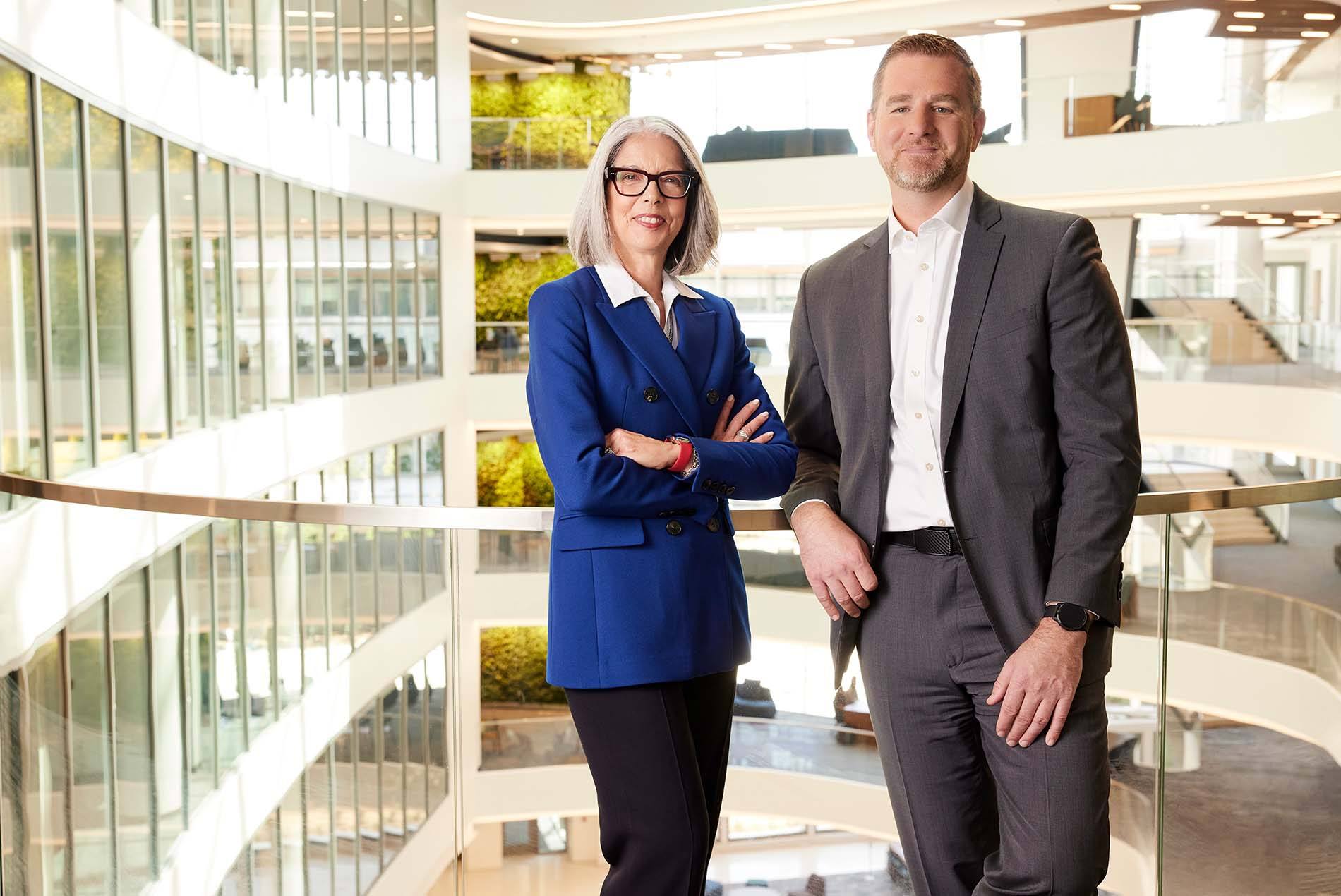HOK has appointed Eli Hoisington, AIA, LEED AP, and Susan Klumpp Williams, AIA, LEED AP, as its new co-chief executive officers, succeeding Bill Hellmuth, FAIA, LEED AP, who passed away on April 6, shortly after his scheduled retirement.
Hoisington and Klumpp Williams, who have served as interim co-CEOs since Hellmuth went on medical leave in May 2022, bring a fresh yet familiar perspective to HOK’s leadership. They have previously led two of the firm’s largest offices and are longstanding executive committee members.
Hoisington, the design principal in St. Louis, and Klumpp Williams, the managing principal in Washington, D.C., have collaborated closely with Hellmuth in the past. They will work with HOK’s board to steer the firm’s design vision, business strategy and operations.
Hellmuth’s legacy spans 32 years with HOK, having served as CEO since 2016 and chairman since 2017. His tenure saw HOK win hundreds of design awards, strengthen its commitment to sustainable and regenerative design, open three new offices, diversify its leadership, and increase its pro-bono work and charitable giving. Under Hellmuth’s guidance, HOK earned recognition as one of Time Magazine’s most influential companies and consistently ranked among the world’s largest and greenest architecture/engineering firms.
Hoisington, 46, and Klumpp Williams, now in her 38th year with the firm, break new ground as the youngest and first woman CEOs in HOK’s 68-year history. They bring complementary skill sets and extensive experience to their new roles.
HOK President Carl Galioto, FAIA, LEED AP, praised the new co-CEOs, stating, “Combining Eli’s design expertise and Susan’s business acumen in this new co-CEO leadership structure will drive HOK’s evolution as a more diverse, collaborative and international design firm.”
Hoisington expressed his commitment to enhancing HOK’s global presence as a preeminent, interdisciplinary design firm while building on Hellmuth’s legacy: “Design remains our core focus, shaping everything from project opportunities and business organization to innovation, research, education, mentorship and community engagement. Above all, we will continue using design to improve lives, heal the planet and contribute to the success of our clients.”
Klumpp Williams shared her experience working with Hellmuth: “Having collaborated with Bill in D.C. for 32 years, I understand how he maintained our founders’ vision for a diverse, design-focused practice. Eli and I will work in a similar manner, with him concentrating on design and me continuing my focus on operations.”
As the first woman CEO in HOK’s history, Klumpp Williams acknowledged the significance of her role: “This is an opportunity to underscore the power of diverse leadership. It also demonstrates HOK’s dedication to fostering diversity and inclusion across the firm. I’m eager to contribute to this ongoing transformation and further HOK’s commitment to ensuring that all our staff have equitable experiences in their career growth.”
Related Stories
| Nov 15, 2010
Gilbane to acquire W.G. Mills, Inc.
Rhode Island-based Gilbane Building Company announced plans to acquire W.G. Mills, Inc., a construction management firm with operations based in Florida. The acquisition will dramatically strengthen Gilbane’s position in Florida’s growing market and complement its already established presence in the southeast.
| Nov 11, 2010
Saint-Gobain to make $80 million investment in SAGE Electrochromics
Saint-Gobain, one of the world’s largest glass and construction material manufacturers, is making a strategic equity investment in SAGE Electrochromics to make electronically tintable “dynamic glass” an affordable, mass-market product, ushering in a new era of energy-saving buildings.
| Nov 11, 2010
Saint-Gobain to make $80 million investment in SAGE Electrochromics
Saint-Gobain, one of the world’s largest glass and construction material manufacturers, is making a strategic equity investment in SAGE Electrochromics to make electronically tintable “dynamic glass” an affordable, mass-market product, ushering in a new era of energy-saving buildings.
| Nov 11, 2010
USGBC certifies more than 1 billion square feet of commercial space
This month, the total footprint of commercial projects certified under the U.S. Green Building Council’s LEED Green Building Rating System surpassed one billion square feet. Another six billion square feet of projects are registered and currently working toward LEED certification around the world. Since 2000, more than 36,000 commercial projects and 38,000 single-family homes have participated in LEED.
| Nov 10, 2010
$700 million plan to restore the National Mall
The National Mall—known as America’s front yard—is being targeted for a massive rehab and restoration that could cost as much as $700 million (it’s estimated that the Mall has $400 million in deferred maintenance alone). A few of the proposed projects: refurbishing the Grant Memorial, replacing the Capitol Reflecting Pool with a smaller pool or fountain, reconstructing the Constitution Gardens lake and constructing a multipurpose visitor center, and replacing the Sylvan Theater near the Washington Monument with a new multipurpose facility.
| Nov 9, 2010
Just how green is that college campus?
The College Sustainability Report Card 2011 evaluated colleges and universities in the U.S. and Canada with the 300 largest endowments—plus 22 others that asked to be included in the GreenReportCard.org study—on nine categories, including climate change, energy use, green building, and investment priorities. More than half (56%) earned a B or better, but 6% got a D. Can you guess which is the greenest of these: UC San Diego, Dickinson College, University of Calgary, and Dartmouth? Hint: The Red Devil has turned green.
| Nov 9, 2010
12 incredible objects being made with 3D printers today
BD+C has reported on how 3D printers are attracting the attention of AEC firms. Now you can see how other creative types are utilizing this fascinating printing technology. Among the printed items: King Tut’s remains, designer shoes, and the world’s smallest Rubik’s Cube.
| Nov 9, 2010
U.S. Army steps up requirements for greening building
Cool roofs, solar water heating, and advanced metering are among energy-efficiency elements that will have to be used in new permanent Army buildings in the U.S. and abroad starting in FY 2013. Designs for new construction and major renovations will incorporate sustainable design and development principles contained in ASHRAE 189.1.









